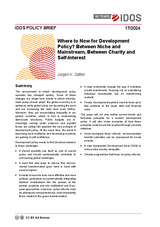Policy Brief
Where to now for development policy? Between niche and mainstream, between charity and self-interest
Zattler, JürgenPolicy Brief (17/2024)
Bonn: German Institute of Development and Sustainability (IDOS)
DOI: https://doi.org/10.23661/ipb17.2024
Dt. Ausg. u.d.T.:
Quo Vadis, Entwicklungspolitik? Zwischen Nische und Mainstream, zwischen Almosen und Eigeninteresse
(Policy Brief 15/2024)
The environment in which development policy operates has changed quickly. Some of these changes are longer-term trends to which development policy should adapt: the global economy is in upheaval, while global crises are becoming the norm and are increasing the debt level even further. Moreover, they are exacerbating inequality in our partner countries, which in turn is undermining democratic structures. Public budgets are increasingly coming under pressure and populist forces are calling into question the very principle of development policy. At the same time, the world is becoming more multipolar and developing countries are gaining in self-confidence.
Development policy needs to find structural answers to these challenges:
• It should explicitly see itself as part of overall policy and should systematically contribute to overcoming global challenges;
• It must find new ways to ensure that environmental transformation goes hand in hand with social progress;
• It needs to become even more effective and more political, particularly by systematically integrating bilateral contributions into the policies of the partner countries and into multilateral and European approaches; moreover, policy reforms must be addressed comprehensively, most importantly those related to the green transformation;
• It must profoundly change the way it mobilises private investments, focusing not on subsidising individual investments but on transforming markets;
• Finally, development partners need to team up to find solutions to the acute debt and financial crisis.
This paper will not only outline current trends and formulate principles for a modern development policy. It will also show examples of how these principles could be put into practice through concrete initiatives:
• Socio-ecological fiscal reforms: environmentally harmful subsidies can be repurposed for social security
• A new Sustainable Development Goal (SDG) to reduce intra-country inequality
• Climate program
Kontakt
Cornelia Hornschild
Koordinatorin Publikationen
E-Mail Cornelia.Hornschild@idos-research.de
Telefon +49 (0)228 94927-135
Fax +49 (0)228 94927-130
Alexandra Fante
Bibliothekarin/Open Access-Koordinatorin
E-Mail Alexandra.Fante@idos-research.de
Telefon +49 (0)228 94927-321
Fax +49 (0)228 94927-130



